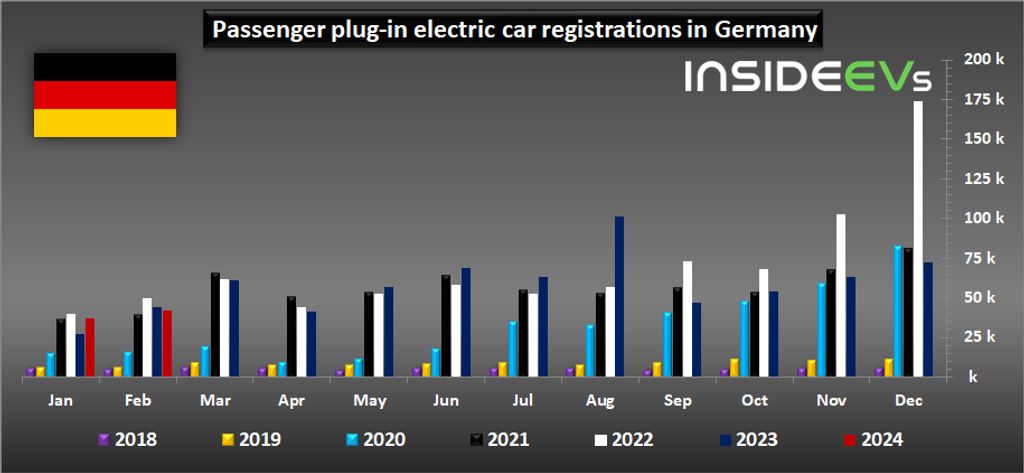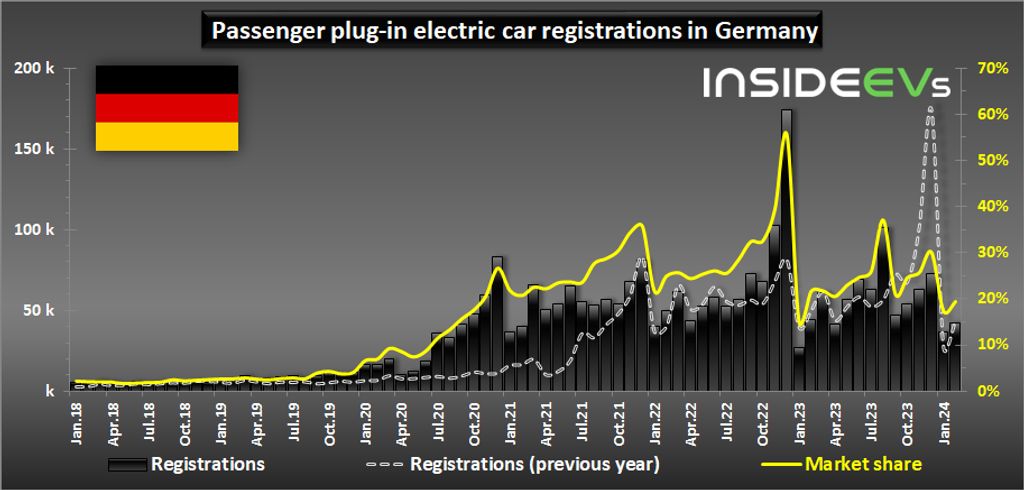In February, new passenger car registrations in Germany amounted to 217,388, up 5.4% year-over-year. During the first two months of the year, the number of registrations exceeded 430,000 (up almost 12%).
Unfortunately, the progress on the plug-in electric car front is mixed, as all-electric car sales were down slightly and only plug-in hybrids noted some growth.
Get Fully Charged
German plug-in car market
Germany is Europe’s largest car market and plug-in electric cars are no exception. In 2023, almost 700,000 new plug-in cars were registered in Germany, including over 524,000 all-electric.
In February, the total new plug-in electric car registrations amounted to 42,054, down 5% year-over-year. The market share decreased to 19.3%, compared to 21.5% a year ago. Nonetheless, the situation is not that bad, considering that in previous periods, the segment was supported by generous incentives.
Battery-electric car registrations decreased by 15% year-over-year to 27,479, taking 12.6% of the market (compared to 15.7% a year ago and 14.1% two years ago).
Plug-in hybrid car sales continued to rebound for the second consecutive month. The number of new registrations amounted to 14,575 (up 22% year-over-year).
Plug-in car registrations last month (YOY change):
- BEVs: 27,479 (down 15%) and 12.6% market share
- PHEVs: 14,575 (up 22%) and 6.7% market share
- Total: 42,054 (down 5%) and 19.3% market share
So far this year, new passenger plug-in electric car registrations amounted to roughly 79,000 (up 11%), which is about 18% of the total volume.
Plug-in car registrations year-to-date (YOY change):
- BEVs: 49,953 (down 1%) and 11.6% market share
- PHEVs: 28,969 (up 39%) and 6.7% market share
- Total: 78,922 (up 11%) and 18.3% market share
For reference, in 2023, 699,943 new passenger plug-in electric cars were registered in Germany, which was close to 25% of the total volume.
One of the most spectacular findings is that Tesla achieved the highest number of plug-in car registrations in Germany last month, despite selling only all-electric cars. The company noted 6,038 units (down 22% year-over-year).
Mercedes-Benz was second best with 5,654 new plug-in registrations, but only 2,238 all-electric cars. BMW was third with 3,994 units (2,478 all-electric). Meanwhile, Volkswagen was third with 2,916 units (2,553 all-electric).
Plug-in car registrations by brands (at least 1,000) last month:
- Tesla: 6,038 BEVs
- Mercedes-Benz: 5,654 – 2,239 BEVs and 3,415 PHEVs
- BMW: 3,994 – 2,478 BEVs and 1,516 PHEVs
- Volkswagen: 2,916 – 2,553 BEVs and 363 PHEVs
- Volvo: 2,914 – 1,247 BEVs and 1,667 PHEVs
- Audi: 2,640 – 1,570 BEVs and 1,070 PHEVs
- Seat: 2,232 – 973 BEVs and 1,259 PHEVs
- MG Roewe: 1,782 – 1,781 BEVs and 1 PHEV
- Hyundai: 1,544 – 1,260 BEVs and 284 PHEVs
- Porsche: 1,538 – 212 BEVs and 1,326 PHEVs
- Kia: 1,401 – 1,006 BEVs and 395 PHEVs
- Skoda: 1,390 – 1,260 BEVs and 130 PHEVs
- Ford: 1,246 – 179 BEVs and 1,067 PHEVs
- smart: 1,205 BEVs
- Opel: 1,023 – 448 BEVs and 575 PHEVs
After the first two months of the year, Mercedes-Benz remains at the top for plug-ins, but there is no match for Tesla in the all-electric car segment. Tesla is the number one with 9,190 units sold, even though its volume decreased 23% year-over-year.
Plug-in car registrations by brands year-to-date (at least 2,000):
- Mercedes-Benz: 11,712 – 4,597 BEVs and 7,115 PHEVs
- Tesla: 9,190 BEVs
- BMW: 7,918 – 4,721 BEVs and 3,197 PHEVs
- Audi: 6,158 – 3,877 BEVs and 2,281 PHEVs
- Volkswagen: 5,092 – 4,288 BEVs and 804 PHEVs
- Volvo: 4,800 – 2,108 BEVs and 2,692 PHEVs
- Seat: 3,469 – 1,171 BEVs and 2,298 PHEVs
- Skoda: 2,998 – 2,717 BEVs and 281 PHEVs
- Hyundai: 2,797 – 2,158 BEVs and 639 PHEVs
- Porsche: 2,637 – 560 BEVs and 2,077 PHEVs
- Kia: 2,576 – 1,753 BEVs and 823 PHEVs
- Ford: 2,457 – 284 BEVs and 2,173 PHEVs
- Opel: 2,409 – 1,002 BEVs and 1407 PHEVs
- smart: 2,385 BEVs
- MG Roewe: 2,299 – 2,297 BEVs and 2 PHEVs
The Tesla Model Y remains the best-selling all-electric car model in Germany, with 7,801 new registrations year-to-date, far exceeding other EVs.
Next, we can see two MEB-based models from the Volkswagen Group: Skoda Enyaq iV (2,717 units) and the Audi Q4 e-tron (2,313). The Volkswagen ID.4/ID.5 (1,978) is noticeably behind, and its volume is almost 45% lower than a year ago at this point.
Top all-electric models year-to-date in 2024 (YOY change):
- Tesla Model Y – 7,801 (down 23%)
- Skoda Enyaq iV – 2,717 (up 78%)
- Audi Q4 e-tron – 2,313 (up 18%)



